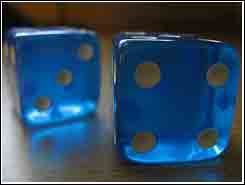Spirituality
How Superstitions Really Work
How to leverage belief to affect outcome
Posted June 10, 2012

Photo: Bludgeoner86
According to a Gallup poll, almost 50 percent of Americans are superstitious, believing that certain rituals, like wearing unmatched socks, will influence the likelihood of an event, like pitching a no-hitter. Yet few people—or polls—attempt to determine exactly what force connects such rituals with such outcomes.
Until now, that is. In a 2010 paper entitled "Keep Your Fingers Crossed! How Superstition Improves Performance," researchers Lysann Damisch, Barbara Stoberock, and Thomas Mussweiler argue that not only do superstitions give people a sense of control in chaotic situations, but also that superstitions create directly observable performance improvements. In one experiment, twenty-eight college students were asked to make ten attempts to putt a golf ball. A pretest showed that more than 80 percent of them believed in good luck, so while handing the ball over to the participants, the experimenter said, “Here is your ball. So far it has turned out to be a lucky ball” (which experimenters dubbed the superstition-activated condition) or “This is the ball everyone has used so far” (which experimenters dubbed the control condition). Results showed that subjects who'd been given a "lucky ball" performed better than subjects given a "normal" ball. In another experiment reported in the same paper, when subjects were allowed to perform a task in the presence of a lucky charm they'd brought with them from home, their performance was better than those whose lucky charms were removed while they were performing the task. The subjects who were allowed to keep their lucky charms with them also reported a higher sense of self-efficacy. Anxiety levels were identical between the two groups, however.
The researchers then performed another experiment. The same subjects with and without their lucky charms were asked to work anagram problems. Researchers again found those subjects who were allowed to keep their lucky charms with them performed better — and this time they identified the reason: the increased sense of self-efficacy experienced by the subjects who had their lucky charms with them led to them to persist in trying to solve the anagrams longer. In other words, when it comes to tasks whose outcome depends on our performance, believing that some other power is helping us actually does help us — not because such external powers exist, but because our belief in them enhances our confidence, which translates into real-world differences in persistence.
This effect may be more important and more widespread than many of us may realize. One area in which it may have particular relevance, for example, is alcoholism. Alcoholics Anonymous may significantly increase the likelihood of long-term abstinence, but if so no one has yet to show how or why. Members are taught that they're powerless against alcohol themselves and so must rely on a higher power to find the strength to resist the urge to drink — and many if not most members credit their higher power as the reason for their abstinence.
But is it? A minority of AA members don't actually believe in God and are often told to turn over their addiction to whatever higher power they can believe in. Anecdotally at least, these people are just as often successful as people who believe the higher power helping them to not drink is God. One wonders, then, if the results from the studies I mentioned above come into play here. Might AA be successful, at least partly, not because a higher power is helping its members to remain abstinent but because the belief that a higher power is helping them to remain abstinent helps them to remain abstinent?
Which raises the intriguing possibility that any belief, whether true or not, which increases our confidence might have the same power to get us what we want when the outcome depends on our own performance. Prayer in any religion, then, might be effective not because it actually invokes a supreme being or even a mystic law, but because it invokes our belief in those things, invokes a sense that we have an "ace in the hole," which then provides us the confidence to perform better, to keep trying, and to remain optimistic.
A belief in a force external to ourselves that can be invoked to help us may not be merely comforting, then. It may be a powerful psychological lever we can pull to access forces within ourselves that actually affect our ability to achieve what we want — even if our belief is incorrect.
Which raises a troubling question: What if our belief is incorrect? Should we care? Should we pursue the truth even if it may mean forfeiting not just a comforting notion but a notion that may help us succeed in life? What do readers think?
Check out Dr. Lickerman's book, The Undefeated Mind, which will be published in late 2012.


